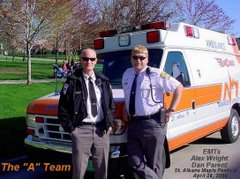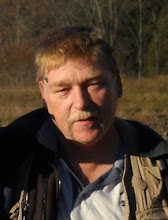We eventually figured out that the state park people were waiting for us at the dock on the mainland with a boat, and that the Town Fire Dept. would be about 10 minutes behind us with their rescue boat, leaving from their dock (which is closer to the station). We rolled up to the small picnic area at the end of the point, being directed by bystanders toward the docks. Our second ambulance was well on the way by then, so we parked our rig as close to the dock as we could and started grabbing gear.
Knowing the general nature of a call before rolling up on scene allows us to grab the gear we might need as we exit the ambulance. Additional gear is usually just a few short steps away if it turns out we're gonna need, say a stair-chair or scoop stretcher. When you leave your ambulance behind while you race away on a boat, however, you just gotta think of everything with the first grab. Thinking Cardiac Arrest, we grabbed the jump bag (essentially a combination Code 99/trauma bag: O2, BVM, combitube, airway adjucts, suction, IV supplies, and just about everything you'd need for bleeding control), the ALS bag (meds, airway, IV stuff, pulse-ox, stethoscope, BP cuff, glucometer), a backboard, c-collar (who knows?), headblocks, extra blankets, gloves and more gloves, and last but not least our trusty Zoll (12-lead ECG, and defibrillator). The boat operator, who works for the State of Vermont Dept. of Parks, turned out to be cool under pressure, willing and able to help with gear, and an absolute pro behind the wheel of the 24' Boston Whaler he had idling there for us.
Between keeping tabs on the radio chatter, making sure the gear was in the best place to keep it dry and secure, and holding on for dear life, the ride to Burton Island went quickly. It was a warm evening, and I told Kari that "we ought to get out boating more often", to which she replied "yeah, without the 30 minutes of CPR we have to look forward to, this wouldn't be bad." As the whaler approached the small island marina, we could see a pretty good sized gathering at the dock. A green State of VT issue pickup truck was at the edge of the dock, ready to carry us on the next leg of this unusual call.
Our craft's captain maneuvered expertly around the mix of private and state-park boats, including the big ferry used to trundle campers between the island and the mainland, and stopped smoothly at the dock. A handful of park workers and bystanders helped with the gear, lugging it the 20 or so feet to the back of the waiting pickup. Kari and I jumped in the back and the truck sped off down the gravel road towards the campsites. We turned this way and that, leaving the open of the dock area and heading into the heavily wooded campground. I was surprized at the size of this island-park, thinking that this leg of the trip alone would have been tough if I had it to navigate with only a dispatcher's directions. Finally the truck ground to a stop near a small gathering of tents and leantos which looked out over a rocky beach. A woman ran up to us and started rapid-firing details about the patient and the situation, while leading the way through someone's campsite and toward the water.
EMTs develop a sense that usually tells us at the first glimpse of the patient, how serious the call is going to be. Considering it was at least 20 minutes from the time the call was dispatched to my first look at what I was expecting to be a pulseless and apneic person, I was shocked and relieved to see, supine on the beach, surrounded by a small group of family and friends, a man in his 40's with his eyes open and a look on his face that told me he was aware of what was happening! Now I often use humor (when appropriate of course) to help ease the patient's fear and apprehension they must feel when they are sick or hurt enough to need an ambulance. I may have overdid it a bit this time, however. My first words to him as I knelt down and checked his pulse were, "Man, you don't look anywhere near as dead as we thought you were gonna be!" Luckily Our guy took it very well, even producing a small smile.
Not a code, but our patient still needed immediate treatment and transport. I didn't like the look of his vitals and knew we had a way to go to get him to definitive care. Suddenly, we were joined by a small army of Town firefighters and first responders. Getting the patient backboarded and moved to the pickup truck went smoothly with the extra help.
We ended up taking the Town Fire boat back and were greatly relieved to find our back-up ambulance at the dock, complete with crew. They had everything ready, so the transfer from the boat to a stretcher, to the ambulance went smoothly. As we cruised on toward the hospital, our pager went off, notifying us of a transport to Burlington that was pending, the anti-climax to an exciting and unusual call.
One northern Vermont Emergency Medical Technician's journey through a career in Emergency Medical Services.
Why do I write this stuff?? To chase out of my brain the daily craziness of being an EMT in a rural area, despite the great people I get to work with.
Websites of Interest
- My Facebook Page
- Enosburgh Ambulance Flying Club blog
- MedicCast - Podcasts and EMS info
- Council for the Advancement of Pre-hospital Medicine
- EMTLife.com - Great Forums for EMS providers
- Rural EMS Resources
- EMS House - Good Stuff!
- 1st Responder News
- Journal of Emergency Medical Services
- AmCare Ambulance Service's website
- EMT City - Online Forums and Discussions on EMS
- State of VT Office of EMS
- You Tube!
Disclaimer!
The views expressed in this blog are those of the author only. I write what I believe, through my experience and knowledge, to be the truth. These entries do not reflect the views, opinions, policies, or philosophies of AmCare Ambulance Service, Enosburgh Ambulance Service, or anyone related to them other than myself.
Enosburgh Ambulance's New Truck

DanVTEMT with our new Demers' Millenium ambulance
About Me
The "A - Team"

Alex and I at the Maple Festival, St. Albans, VT, April 2006
Heroes
- Robert Kennedy - A great man and visionary of his time, cut down just when this counrty really needed his leadership.
- WWII Vets - We are losing these heroes all too quickly, but they are still everywhere in our society: Tell one of them "Thank-You", you owe it to them.
- Service Men & Women overseas. Regardless of how you may feel about the war, these men and women are putting it on the line everyday.
- Neil Young - A terrific outlook on life; with a career spanning over 4 decades, his music still gives me chills. And boy can he rock on his "old black" Gibson Les Paul!
My Favorite Quotes
"Few will have the greatness to bend history itself; but each of us can work to change a small portion of events, and in the total of all those acts will be written the history of this generation."
-Robert Kennedy
"It is not the critic who counts: not the man who points out how the strong man stumbles or where the doer of deeds could have done better. The credit belongs to the man who is actually in the arena, whose face is marred by dust and sweat and blood, who strives valiantly, who errs and comes up short again and again, because there is no effort without error or shortcoming, but who knows the great enthusiasms, the great devotions, who spends himself for a worthy cause; who, at the best, knows, in the end, the triumph of high achievement, and who, at the worst, if he fails, at least he fails while daring greatly, so that his place shall never be with those cold and timid souls who knew neither victory nor defeat."
-Theodore Roosevelt
"Citizenship in a Republic,
"Speech at the Sorbonne,
Paris, April 23, 1910
-Robert Kennedy
"It is not the critic who counts: not the man who points out how the strong man stumbles or where the doer of deeds could have done better. The credit belongs to the man who is actually in the arena, whose face is marred by dust and sweat and blood, who strives valiantly, who errs and comes up short again and again, because there is no effort without error or shortcoming, but who knows the great enthusiasms, the great devotions, who spends himself for a worthy cause; who, at the best, knows, in the end, the triumph of high achievement, and who, at the worst, if he fails, at least he fails while daring greatly, so that his place shall never be with those cold and timid souls who knew neither victory nor defeat."
-Theodore Roosevelt
"Citizenship in a Republic,
"Speech at the Sorbonne,
Paris, April 23, 1910


No comments:
Post a Comment